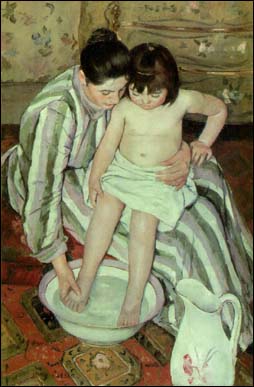Ex Church of Christ support groupHome * Website Purpose * History * UnBiblical Teachings * Spiritual Abuse Jesus' View of God * Faith & Works * New Covenant * The Pattern * Romans 14 |
|
Instrumental Music_____________________________________________ Instrumental music was commanded by God in the Temple. But when the Babylonian captivity came along the Jews did not have access to the Temple for 70 years. So they established the synagogue system. The Pharisees became powerful about 200 years before Christ. Since Jehovah-God had punished the Jews for worshiping idols by having them taken captive into Babylon (500 years before Christ), the Pharisees decided to be as safe and strict as possible in order not to be punished as a people by God again. The Grove Concise Dictionary of Music states that the tradition of a capella singing originated with the Pharisees. The Pharisees thought that anyone who played an instrument would be breaking the Sabbath ban against work by tuning or carrying their instruments. So synagogue worship was limited to a capella singing. If it is true that there was only a capella singing in the synagogue, it makes sense that early Jewish converts would sing a capella, because of those same issues of conscience that would limit them from eating unclean meats. Others have theorized that synagogue worship contained no music or singing at all and focused entirely on praying, reading and teaching, and only later included chanting of the Psalms. See I Tim. 4:13. The Roman Catholic Church sang in unison until it accepted two part and four part harmony in the Middle Ages. The use of instruments in worship was introduced about 1000 A.D. probably by a pope who had been an organ maker. The use of musical instruments in churches was hotly debated, the Eastern Orthodox Church rejecting it. Among the Reformationists, Martin Luther accepted instruments of music. Ulrich Zwingli began the Swiss Reformation, at exactly the same time as Martin Luther's 95 theses against the sale of indulgences, also opposing the sale of indulgences. Eventually Zwingli did not allow any musical instruments in the church, although he could play many instruments himself. Zwingli believed the abuses of the instruments in the Roman Catholic Church obstructed the understanding of the word, and he wanted the focus of the assembly to be on the preaching of the word. However Zwingli encouraged lively singing. (Zwingli has perhaps had the most influence of the reformers on American evangelicalism today, not only in his emphasis on preaching and singing, but also in his rejection of the Lord's Supper as a miraculous occurrence, though some argue this was more due to the Enlightenment than to Zwingli.) An Anabaptist, Grebel in Zurich Switzerland in 1524 was perhaps the originator of the regulative and normative principles, which became Command, Example and Necessary Inference in the Churches of Christ (more on this below), popularized by Ulrich Zwingli, also of Zurich, Switzerland at the same time, and his protege, John Knox in the Scottish Presbyterian Church. John Calvin, in the next generation of reformers, did not permit instruments of music either. John Calvin restricted the songs to mostly the Psalms in the Bible, and only allowed unison singing, no four-part harmony (Calvinists became The Reformed Christian Church [Holland and Switzerland], the Presbyterian Church [Scotland], and the Puritans [Congregationalists and Plymouth Brethren].) Baptists went back and forth on the topic, mostly opposing instrumental music on the basis that the Church of England used instruments. The Pilgrims landed at Plymouth Rock in 1620. The first book printed in the new world was the Bay Psalm Book in 1640. In the preface of the Baye Psalm Booke there are clearly articulated all the arguments the Churches of Christ use for no instruments of music, no choirs, no soloists: Command, Example and Necessary Inference. But they go one step further: no human written hymns are permitted to be sung, to be safe only the Psalms which are inspired by God's breath my be sung in the church. All of these principles started with the logic of the Enlightenment, filtered through Ulrich Zwingli, Calvin and John Knox. All Protestant churches (except the Episcopal/Church of England) in the American colonies did not use instrumental music until about 1730, when the first bass viol was introduced in Congregationalist Churches (previously the Puritans who trace their history to John Calvin), soon followed by a quartet of wind and string instruments. From 1760 to 1860 there was a vicious fight between those who wanted instruments and those who did not. By 1860 most protestant churches were competing to see who could build the biggest pipe organ in town. Some of the Presbyterian and Reformed churches still do not allow any hymns except the Psalms. Some churches believe it is wrong to have musical notation, only including the words of the songs in the hymn book. The hard line a capella Churches of Christ have roots mostly in Appalachian cultures in the United States. As the American frontier moved westward, the Appalachian frontier farmers maintained acapella singing in the Churches of Christ, eventually splitting with the Christian Church around 1820-1860 over instrumental music and the formation of the first denominational society with elected representatives (the Churches of Christ opposing). A lesser known reason for the split is that the first convention endorsed abolitionism, alienating the Appalachian Churches of Christ. Most of the city churches adopted organs, with the rural churches remaining a capella. Interestingly, there is a Presbyterian group that uses the exact same logic as the hard-line Churches of Christ to ban instruments of music in worship, known in Presbyterian circles and conservative Reformed Churches as the regulative principle of worship (in contrast to the normative principle of worship). So the roots of using the silence of scripture, to ban any other worship in the Churches of Christ, goes back to the legacy of Alexander Campbell's Presbyterianism, John Knox and his mentor Ulrich Zwingli. Present-day Christian religious bodies who believe in unaccompanied singing include some Presbyterian churches, Old Regular Baptists, Primitive Baptists, Free Will Baptists, Plymouth Brethren, the Old German Baptist Brethren, the Eastern Orthodox Christian Church, the Amish and Old Order Mennonite. The Sacred Harp Shape Note tradition, which has clubs throughout the United States (and in major cities throughout the world) preserves the Appalachian a capella hymn singing tradition. They use several hymn books, the most popular of which is the Sacred Harp, with most hymns written from 1790-1860, and using four shapes (fa, sol, la, mi). If you ask those in the club why the hymn book is named Sacred Harp they will tell you that the harp is the voice. But those in the Churches of Christ know the real reason it is named Sacred Harp is because the only accompaniment authorized by God for singing is the plucking of the strings of the heart, Eph. 5:19. The Incarnation When Jesus came to earth, God in the flesh, He came as a Jewish man. He spoke, dressed, ate, worked and worshiped as a Jewish man. The people around him only had a problem with the way he described God the Father in heaven, how he rebuked them and how he confronted the way they had replaced heavy burdens for worshiping God. Jesus told the Pharisees that when the father welcomed the Prodigal Son back home he threw a big party with music and dancing. The apostle Paul said he had become all things to all people. He did not want to put any stumbling blocks in the way of preaching the good news: that God had come to earth in the flesh and washed all our guilt away. The apostle John said that in heaven we will all have harps to play in praise of God. There are many wonderful Churches of Christ, however, there are also hard-line Churches of Christ who have difficulty even believing the good news that Paul preached. Far from trying to identify with the people (incarnationally) and then speaking the truth about God (as a Father) and the good news about God becoming flesh and dying for us, the hard-line Churches of Christ have focused on being odd, like the Plain Amish and Old Order Mennonites. They have decided to portray a certain culture long ago and to demand that in order to be pleasing to God one must keep these traditions. |
The apostle Paul said he had become all things to all people. He did not want to put any stumbling blocks in the way of preaching the good news: that God had come to earth in the flesh and washed all our guilt away. For another website on instrumental music click here and here. For a comment on the Five Acts of Worship
I was in Walmart the other day behind two young Mennonite women. The cashier asked them if they were Amish and they replied "Mennonite. We just follow the Bible. Nothing else." For a history of shape note singing Luther: "How strange and wonderful it is that one voice sings a simple unpretentious tune while three, four, or five other voices are also sung; these voices play and sway in joyful exuberance around the tune...He must be a coarse clod and not worthy of hearing such charming music, who does not delight in this, and is not moved by such a marvel. He should rather listen to the donkey braying of the [Gregorian] chorale, or the barking of dogs and pigs, than to such music." from Paul Nettl, Luther and Music (Russell and Russell Pub; 1948). |

